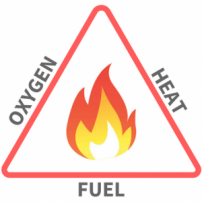As a responsible data centre operator, we at Redcentric have an excellent fire suppression system which uses FM200 gas. Fires are not only a risk to people’s safety, but if one got out-of-control in a data centre, it would cause extensive damage to expensive servers, and result in significant downtime. Traditional fire suppression sprinkler systems containing water have the potential to cause damage to delicate servers, which this is why colocation data centres, including Redcentric, typically use a gas based fire suppression system, such as FM200 to protect our clients’ servers.
How does FM200 work?
FM200 is a non-flammable gas used for fire suppression. It doesn’t damage electronic products, used correctly it’s safe for people to breathe in and can be used in an enclosed space, making it ideal for colocation data centres.
FM200 is the commercial name given to it by its makers, DuPont. Its technical name is ‘heptafluoropropane’ and it is a colourless, odourless halocarbon.
FM200 extinguishes flames by removing the fire’s free radicals, disrupting an element of the fire tetrahedron by effectively preventing the chemical reaction that allows a fire to burn. When the FM200 agent comes into contact with heat (i.e. something on fire) a chemical reaction occurs locally to lower the temperature and extinguish the fire.

It then dissipates, leaving behind no residue, and doesn’t damage any electronic equipment, since it is totally non-conductive. This means all the servers in an affected data hall are able to continue operating as normal.
Why is FM200 used over other fire suppression options?
Water and other foam-based fire suppression systems run the risk of damaging IT equipment, and so are rarely used in colocation data centres. You could follow the logic that they would only damage equipment already damaged by fire, so there’s no harm, but this ignores the risks of:
- Leaks in the distribution pipes
- Accidental release not in the event of a fire
- Equipment near the site of the fire but unaffected by it
All of the above would result in unnecessary damage to servers and downtime, from a system which is supposed to avoid exactly that. In addition to FM200 there are other gas-based fire suppression systems that data centres can use to avoid the above issues, like Argonite.
What are FM200’s biggest advantages
A successful digital transformation is about improving your IT setup, so it’s essential that a fire suppression system is capable of putting out a fire without damaging electronic equipment, but there are a number of gasses capable of doing this, including FM200. There are several reasons why FM200 is chosen by data centres as their method of fire suppression:
1. Quick to take effect
Regardless of the type of fire, FM200 is able to reach extinguishing levels in only 10 seconds, significantly reducing the risk of the fire getting out of control, and limiting the amount of equipment damaged.
2. Safe to use in an enclosed space
FM200, and other gas-based fire suppression systems, have been tested extensively and have a lot of real-world use proving that they’re safe to use in an enclosed space without risk of suffocating anyone. FM200 is even used in some medical inhalers, a testament to how safe it is to inhale.
As an added bonus, FM200 and Argonite are also safe for the environment since they don’t damage the ozone layer like some gases and aerosols do.
3. Saves on storage space
Since only a small amount of FM200 is needed to extinguish a fire, data centres don’t need to store countless canisters to ensure they have enough. This frees up space for more racks or other storage.
What should you be looking for?
With all of the advantages that FM200 has to offer, if a data centre isn’t using it or a similar fire suppression system, such as Argonite, you shouldn’t work with them. If you’re comparing data centres you also need to make sure they have a Very Early Smoke Detection Apparatus in place since it is a data centre’s VESDA that triggers the timely release of FM200.
At Redcentric’s different data centres we use FM200 and Argonite alongside our expertly engineered VESDA system to ensure we have an effective fire suppression system, which is just one element of infrastructure in our award-winning data centres. If you would like to find out more, check out our colocation services, or get in touch to find out how we could help your company specifically.

